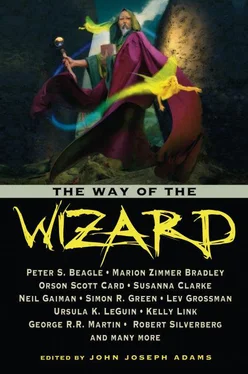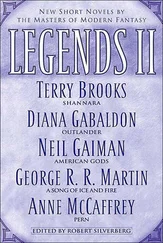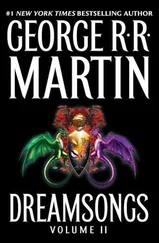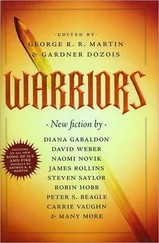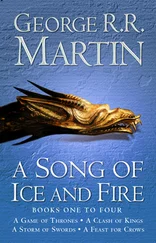“These are dangerous times,” Tolcet said. “For wizards as well as for children.”
“Dangerous times! Hard times! Bad times,” Halsa said. “Things have been bad since the day I was born. Why do I see things and know things, when there’s nothing I can do to stop them? When will there be better times?”
“What do you see?” Tolcet said. He took Halsa’s chin in his hand and tilted her head this way and that, as if her head were a glass ball that he could see inside. He put his hand on her head and smoothed her hair as if she was his own child. Halsa closed her eyes. Misery welled up inside her.
“I don’t see anything,” she said. “It feels like someone wrapped me in a wool blanket and beat me and left me in the dark. Is this what it feels like not to see anything? Did the wizards of Perfil do this to me?”
“Is it better or worse?” Tolcet said.
“Worse,” Halsa said. “No. Better. I don’t know. What am I to do? What am I to be?”
“You are a servant of the wizards of Perfil,” Tolcet said. “Be patient. All things may yet be well.”
Halsa said nothing. What was there to say?
She climbed up and down the stairs of the tower, carrying water, toasted bread and cheese, little things that she found in the swamp. The door at the top of the stairs was never open. She couldn’t see through it. No one spoke to her, although she sat there sometimes, holding her breath so that the wizard would think she had gone away again. But the wizard wouldn’t be fooled so easily. Tolcet went up the stairs, too, and perhaps the wizard admitted him. Halsa didn’t know.
Essa and Burd and the other children were kind to her, as if they knew that she had been broken. She knew that she wouldn’t have been kind to them, if their situations had been reversed. But perhaps they knew that too. The two women and the skinny man kept their distance. She didn’t even know their names. They disappeared on errands and came back again and disappeared into the towers.
Once, when she was coming back from the pier with a bucket of fish, there was a dragon on the path. It wasn’t very big, only the size of a mastiff. But it gazed at her with wicked, jeweled eyes. She couldn’t get past it. It would eat her, and that would be that. It was almost a relief. She put the bucket down and stood waiting to be eaten. But then Essa was there, holding a stick. She hit the dragon on its head, once, twice, and then gave it a kick for good measure. “Go on, you!” Essa said. The dragon went, giving Halsa one last reproachful look. Essa picked up the bucket of fish. “You have to be firm with them,” she said. “Otherwise they get inside your head and make you feel as if you deserve to be eaten. They’re too lazy to eat anything that puts up a fight.”
Halsa shook off a last, wistful regret, not to have been eaten. It was like waking up from a dream, something beautiful and noble and sad and utterly untrue. “Thank you,” she said to Essa. Her knees were trembling.
“The bigger ones stay away from the meadow,” Essa said. “It’s the smaller ones who get curious about the wizards of Perfil. And by curious, what I really mean is hungry. Dragons eat the things that they’re curious about. Come on, let’s go for a swim.”
Sometimes Essa or one of the others would tell Halsa stories about the wizards of Perfil. Most of the stories were silly, or plainly untrue. The children sounded almost indulgent, as if they found their masters more amusing than frightful. There were other stories, sad stories about long-ago wizards who had fought great battles or gone on long journeys. Wizards who had perished by treachery or been imprisoned by ones they’d thought friends.
Tolcet carved her a comb. She found frogs whose backs were marked with strange mathematical formulas, and put them in a bucket and took them to the top of the tower. She caught a mole with eyes like pinpricks and a nose like a fleshy pink hand. She found the hilt of a sword, a coin with a hole in it, the outgrown carapace of a dragon, small as a badger and almost weightless, but hard, too. When she cleaned off the mud that covered it, it shone dully, like a candlestick. She took all of these up the stairs. She couldn’t tell whether the things she found had any meaning. But she took a small, private pleasure in finding them nevertheless.
The mole had come back down the stairs again, fast, wriggly, and furtive. The frogs were still in the bucket, making their gloomy pronouncements, when she had returned with the wizard’s dinner. But other things disappeared behind the wizard of Perfil’s door.
The thing that Tolcet had called Halsa’s gift came back, a little at a time. Once again, she became aware of the wizards in their towers, and of how they watched her. There was something else, too. It sat beside her, sometimes, while she was fishing, or when she rowed out in the abandoned coracle Tolcet helped her to repair. She thought she knew who, or what it was. It was the part of Onion that he’d learned to send out. It was what was left of him: shadowy, thin, and silent. It wouldn’t talk to her. It only watched. At night, it stood beside her pallet and watched her sleep. She was glad it was there. To be haunted was a kind of comfort.
She helped Tolcet repair a part of the wizard’s tower where the stones were loose in their mortar. She learned how to make paper out of rushes and bark. Apparently wizards needed a great deal of paper. Tolcet began to teach her how to read.
One afternoon when she came back from fishing, all of the wizard’s servants were standing in a circle. There was a leveret motionless as a stone in the middle of the circle. Onion’s ghost crouched down with the other children. So Halsa stood and watched, too. Something was pouring back and forth between the leveret and the servants of the wizards of Perfil. It was the same as it had been for Halsa and Onion, when she’d given him the two-faced doll. The leveret’s sides rose and fell. Its eyes were glassy and dark and knowing. Its fur bristled with magic.
“Who is it?” Halsa said to Burd. “Is it a wizard of Perfil?”
“Who?” Burd said. He didn’t take his eyes off the leveret. “No, not a wizard. It’s a hare. Just a hare. It came out of the marsh.”
“But,” Halsa said. “But I can feel it. I can almost hear what it’s saying.”
Burd looked at her. Essa looked too. “Everything speaks,” he said, speaking slowly, as if to a child. “Listen, Halsa.”
There was something about the way Burd and Essa were looking at her, as if it were an invitation, as if they were asking her to look inside their heads, to see what they was thinking. The others were watching, too, watching Halsa now, instead of the leveret. Halsa took a step back. “I can’t,” she said. “I can’t hear anything.”
She went to fetch water. When she came out of the tower, Burd and Essa and the other children weren’t there. Leverets dashed between towers, leaping over each other, tussling in midair. Onion sat on Tolcet’s throne, watching and laughing silently. She didn’t think she’d seen Onion laugh since the death of his mother. It made her feel strange to know that a dead boy could be so joyful.
The next day Halsa found an injured fox kit in the briar. It snapped at her when she tried to free it and the briars tore her hand. There was a tear in its belly and she could see a shiny gray loop of intestine. She tore off a piece of her shirt and wrapped it around the fox kit. She put the kit in her pocket. She ran all the way back to the wizard’s tower, all the way up the steps. She didn’t count them. She didn’t stop to rest. Onion followed her, quick as a shadow.
When she reached the door at the top of the stairs, she knocked hard. No one answered.
“Wizard!” she said.
Читать дальше
